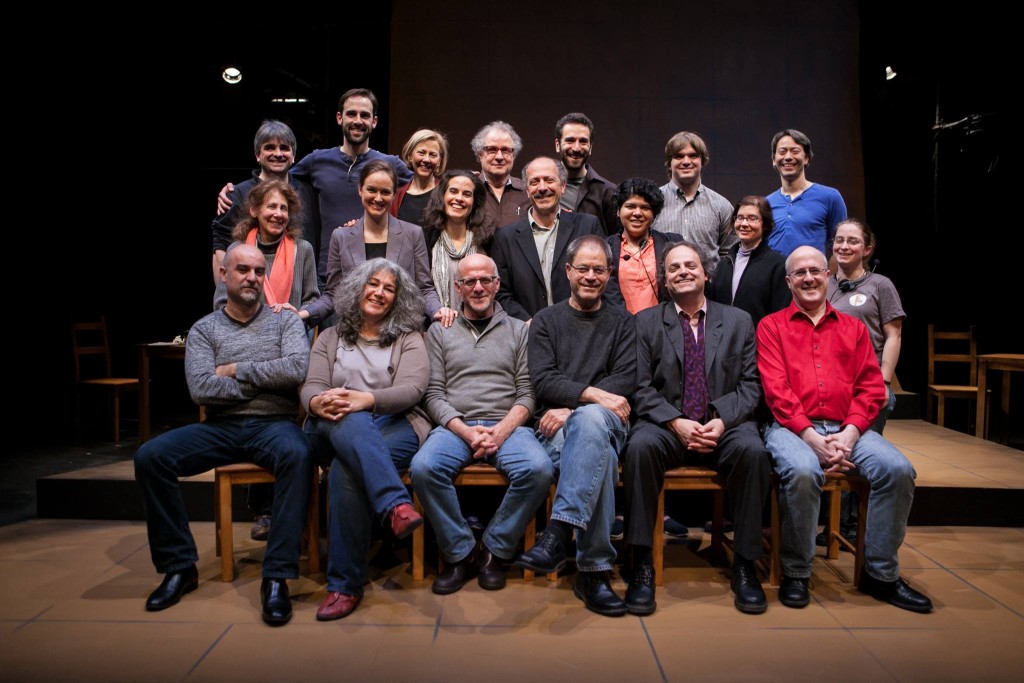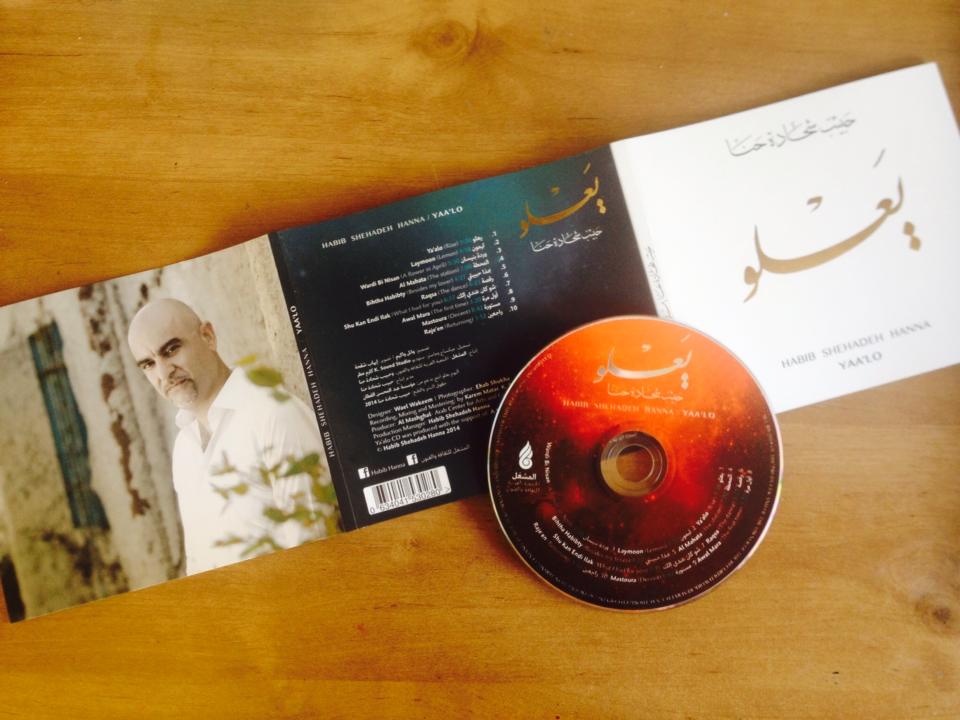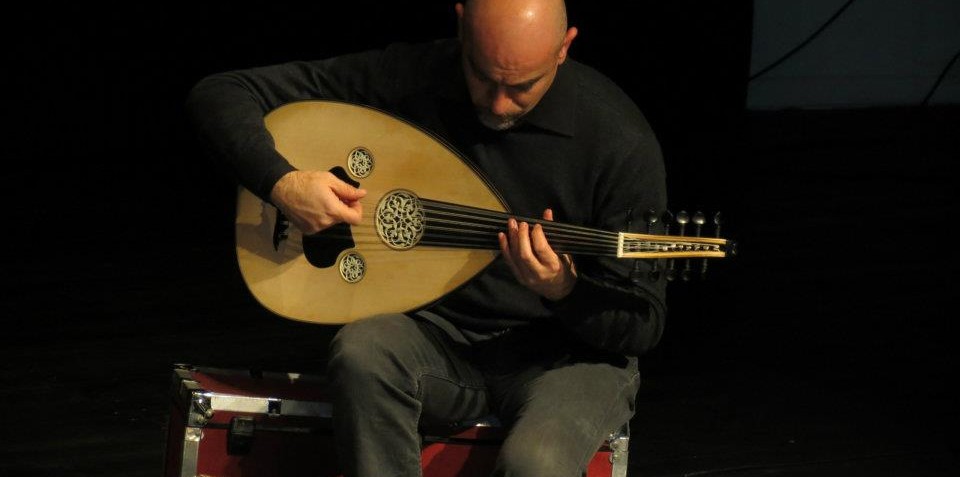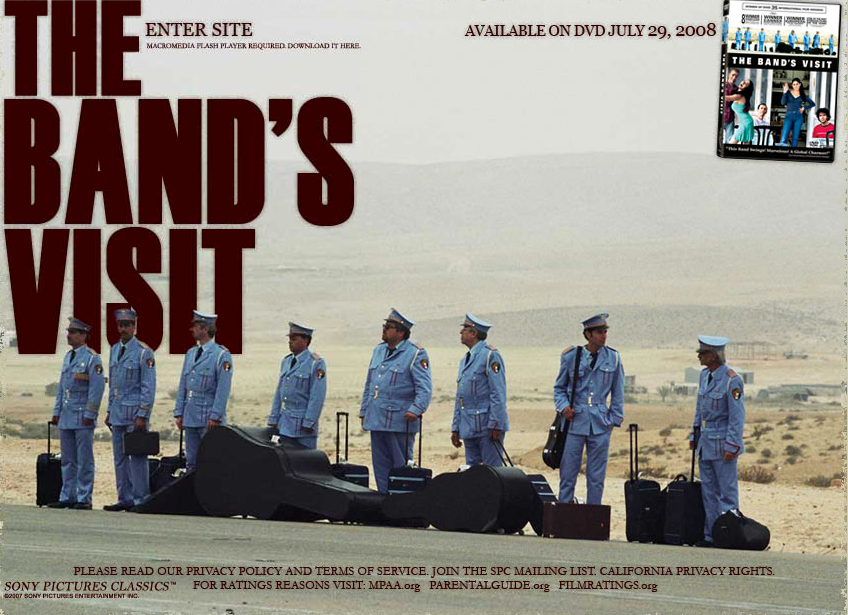Avshi Weinstein, Violinmaker and Co-founder of Violins of Hope living in Turkey
Habib Shedadeh Hanna
Musician, Composer, and Musicologist
Habib is an Arab-Palestinian Christian living in Israel. Born in 1974, Habib grew up in Israel’s Rama Village in Galilee, an ancient site known for its olive trees and pressed oil. When he was a boy, Habib’s Christian family lived among minority Muslims and Druze, peacefully and freely.
Today Habib lives in Haifa with his wife and three children. He is a musicologist and an accomplished musician and composer for live theatre, film, and CD recordings. Since 2011, Habib spent four years writing a comprehensive lexicon of modern music terminology covering the last 100 years. His effort is important because he believes music is one of the cultural arts that helps people maintain their identity. He hopes his lexicon will teach Palestinians about their music and provide an understanding of their culture and its contribution to life.
His interest in music started when he was 12-years-old. Habib’s uncle showed him how to play the Arabic Oud, an ancient lute-like stringed instrument. After two years, his uncle recognized Habib had mastered the Oud and encouraged him to continue studying music. As a teenager, Habib was a gifted athlete and skilled in computers. But his passion was for music. In 1994, Habib decided to apply to the music academy at Hebrew University in Jerusalem. The entrance exam was difficult—he was only one of six students accepted—and the only Palestinian Arab among the new entrants. Habib studied musicology, theory, and composition and later became a teacher at the academy. In 1996, he was called to teach Oud and music theory as well as train student ensembles at the National Conservatory of Music (NCM), now called the Edward Said National Conservatory (ESNCM), in East Jerusalem. In 1999, Habib became the director of NCM’s Branch of East Jerusalem in Ramallah. Working in East and West Jerusalem for several years, Habib enjoyed creating music with Arabs and Jews. But life changed for Habib in 2000 when the Second Intifada began. Unhappy living in Jerusalem, working between East and West Jerusalem, Habib could not cope with the political situation and found it difficult to create music. He decided in 2002 to leave Jerusalem for Haifa where he established a new music conservatory, Al-Mashghal (The Factory)-Arab Centre for Arts and Culture. which he continues to direct today. The Factory is an NGO where students study Eastern Arabic instrumental music and Western classical guitar, piano, and drums.
Habib has collaborated on various music ensembles, including the gorgeous sound of the Oriental Music Ensemble. Inspired by the celebrated Egyptian singer and composer Sayed Darwish, Habib founded the “Sayed Darwish Music Project” in 2002. For this project, Habib wrote new arrangements for Darwish’s songs. That same year, Habib was a guest artist with the Belgian avant-garde jazz band Aka Moon.
Habib played with famous musicians Fabian Fiorini and Kamilya Jubran in a concert called “Crossing Point” performing Arab music from Galilee (2007). He composed music for The Band’s Visit (2007) by Israeli screenwriter and director Eran Kolirin. The film won the UNESCO Award for Outstanding Contribution to the Promotion and Preservation of Cultural Diversity Through Film. It also won several Ophir Awards (also known as the Israeli Oscars), including Best Music. Habib received a nomination for best music from the Israeli Film Academy for his composition in the Lemon Tree (2008) by Israeli filmmaker Eran Riklis.

Habib also composed music for The Admission (2014), an American-Israeli theater production that launched in Washington, DC, collaborating with Israeli director Sinai Peter, Israeli playwright Motti Lerner, and American artistic director Ari Roth. Currently, Habib is composing the music for a new film project that tells the little-known story of Palestinians living inside Israel, produced by NBC in Dubai for the Arab world. Habib says that he is proud to be a part of this important project. Arab countries such as Jordan, Lebanon, Saudi Arabia, and Dubai consider Palestinians living in Israel as Israelis and do not allow them to travel to their countries. Most Arabs are not aware that Palestinian Israelis share the same Arabic culture, music, and language as they do.
Though Habib is an award-winning and highly regarded musician, for several years he has not been hired to compose music for big productions. Despite all of his concerns about his country, the struggle to make a living, the hatred he sees every day in other people’s eyes, he will not leave Israel. Instead he fights for justice and equality in the hopes of turning around an unjust system. Habib protests against the system by not accepting poor paying jobs or taking insufficient funding provided by the Israeli government. Habib defies the government on their policies not because he is against Israel or the Jews but because he and his people are treated poorly and are repressed. They are unable to live freely, are separated from the mainstream, and are not provided with adequate utilities. He takes a strong stand because he wants his people, his family, and himself to be treated equally. He wants coexistence for Jews and Arabs to live in peace.
Recent news reports examine the policies undermining Arab artists. On June 24, 2015, the Jerusalem Post featured an article about the inequality in funding cultural projects and the call for examining the Culture Ministry funding policies. Two weeks later, 972 Magazine reported that Israel’s culture minister is turning artists into enemies. Simply, the government is silencing artists who express their opposition to the Israeli government by depriving them of funding. On July 7, 2015, Haaretz reported a turnaround of Culture Minister Mir Regev who aims to increase funding for Arab culture. Regev’s change in funding policy is a signal that Habib’s and other artists’ efforts to defy the government’s policies that repress Arabs is working.
* * * * * *
The issue for the people of Israel, both Arab and Jew, stems from four words: THE RIGHT TO EXIST. The current struggle for this right to exist began in 1948 with the Arab Israeli War. The war was a victory for the Jews and a disaster for the Arabs. The British Mandate of Palestine divided the land into three parts: the State of Israel, the Jordanian West Bank, and the Egyptian Gaza Strip. About 80% of the Arabs living in the new state of Israel either fled or were expelled. Habib’s hometown, Rama Village, was one of the places where some Palestinians found refuge. The Arabs who remained in Israel were given citizenship, though for nearly 20 years, they were subject to tight restrictions regarding travel, curfews, and expulsion. In 1966, the restrictions were lifted, giving Arabs the same rights as Jewish citizens in Israel.
After the Six-Day War in 1967, military rule was lifted and Arab Israelis were able to contact Palestinians in the West Bank and Gaza Strip. Arabs became more politically active. In the 1970s the Islamic Movement started, impacting the social and political landscape by promoting Islam to Palestinian Israelis. The movement built schools, mosques, and provided social services to the people.
Two uprisings, the First Intifada, between 1987 and 1991, and the Second Intifada, between 2000 and 2005, escalated the tensions, distrust, and polarization between the Israeli Arabs and Jews. The Oslo Accords in 1993 provided a peaceful agreement between the Palestine Liberation Organization (PLO) and Israel. In 2005 an accord between Prime Minister Sharon and President Arafat brought an end to the uprisings and a commitment to peace. However, today since the Second Intifada, many Arabs and Jews living in Israel continue to distrust each other. Palestinian Arabs struggle for independence and the end of the Israeli occupation. Israelis Jews believe in their right to exist and defend themselves against the Palestinians who they perceive as terrorists.
On both sides, some believe the only solution is to have one state—either Palestine for the Arabs or Israel for the Jews. For others, they believe in a two-state solution and a coexistence between Arabs and Jews. Yet coexistence and equality seem unattainable given today’s conflict and inequalities. About a quarter of the population of Israel identify themselves as Palestinian Arabs, the rest are Jews. The Palestinians face tough restrictions, affecting their living conditions, health care, education, and ability to work.
Habib asks that people open up their hearts and minds to understand that not all Palestinians are terrorists, as he knows that not all Jews hate Arabs. He believes that we have a choice and that this continued conflict it Israel can stop. He believes in co-existence. The most simple rule for human beings everywhere is that bad energy builds bad energy and good energy builds good energy. Through music, through connection, through seeking commonality and equality, life in his homeland can change. He is teaching his children to hope and love and to feel positive, despite the hate he sees in other people’s eyes every day.
Avshi Weinstein, Violinmaker and Co-founder of Violins of Hope living in Turkey



